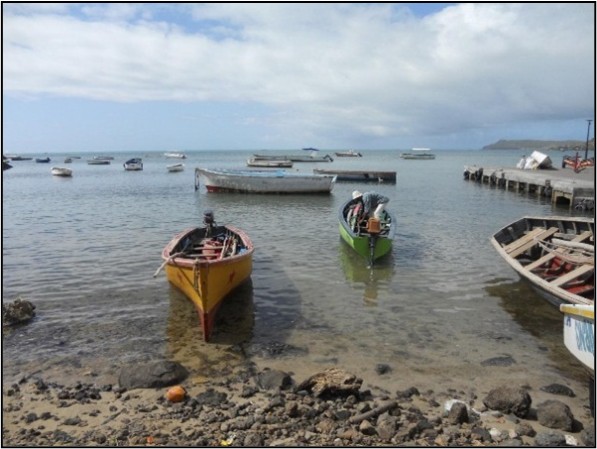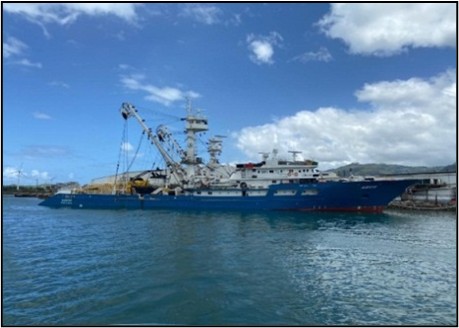Marine Resources Division
The Marine Resources Division is responsible for carrying out research, monitoring and development activities aimed at increasing knowledge on the fishery resources found in our Exclusive Economic Zone (EEZ) with a view to enabling its sustainable utilisation. Its activities include research and assessment of fish stocks, monitoring of fishing activities and the dissemination of information on fisheries matters.
Goal
To plan, develop and manage the fishery resources in a sustainable manner for the benefit of all stakeholders of the fisheries sector and the people at large.
Key priorities
Monitor and carry out research on the different fisheries to ensure sustainable use of the fishery resources.
Objectives
· To improve knowledge on fish stocks and resources.
· To provide advice for best fishery management decisions.
Main activities
The
Marine Resources Division comprises of three units: the Coastal
Fishery Unit, Offshore/Demersal
Fishery Unit and the Pelagic Fishery Unit.
1. The Coastal/Artisanal Fishery Unit is focused mainly on the identification and examination of various marine
specimens such as bony fishes, cartilaginous fishes, shellfishes and sea
urchins. Furthermore, it is also
responsible for the compilation of artisanal fishery catch data in Mauritius.

Artisanal Fishing Boats
The main activities of Coastal/Artisanal Fishery Unit include:
Identification, examination and disposal of seized fish specimens and submission of reports to allow prosecution of defaulters by the Fisheries Protection Service, National Coast Guard and Police;
Carrying out biological analysis of commercial fish specimens to determine sex of fish, gonadosomatic index and gonad maturity stage;
Sampling of octopus specimens island-wide to determine sex, weight and mantle length, during opening seasons for octopus fishing and
Carrying out size frequency sampling for coastal and commercial fishes.
2. The Offshore Demersal Fishery currently comprises semi-industrial fisheries on the fishing banks (e.g. the Nazareth Bank, Albatross Bank, St Brandon Bank) and industrial fisheries for demersal fish on the high seas. The main objective of the unit is to monitor the different fisheries so that exploitation of resources is done in a sustainable manner. The main activities include:
The collection, verification and processing of logbook and logbook data from the different fisheries;
Estimation and analysis of Catch per Unit Effort, catch by species, catch by banks;
Collection of length and weight data of targeted species during unloading of fishing vessels;
Ensuring compliance to the different Southern Indian Ocean Fisheries Agreement (SIOFA) Conservation and Management Measures;
Compilation preparation and submission of the data and information to the SIOFA and
Attend quota allocation committees, provide recommendations and monitor catch and allocated quotas.
3.The Pelagic Fishery Unit mainly monitors the tuna fishery which includes all tuna catches and by-catch made by the Mauritian tuna fleet. The main objective of the unit is to contribute to the conservation and optimum utilisation of the tuna stocks in the Indian Ocean.
The activities and catch of all the local-flagged and foreign licensed tuna purse seiners and longliners calling at Port Louis are closely monitored. Monitoring is carried out through the mandatory submission of fishing logbooks which include amongst others catch, effort and Drifting Fish Aggregating Devices (DFADs) data.
The main activities of Pelagic Fishery Unit include:
-Verification, input and processing of all fishing logbooks from the tuna fishing vessels unloading at Port Louis;
-Carrying out size frequency exercises on industrial tuna fishing vessels in port and on the boats involved in the coastal tuna FAD Fishery at Fish Landing Stations;
-Analysis of catch and effort data for understanding catch trends, exploitation rates and catch distribution of tuna;
-Compilation, processing and submission of all tuna related data to the Indian Ocean Tuna Commission within set deadlines;
-Ensure compliance with all the IOTC Conservation and Management Measures (CMMs);
-Provide views on all tuna related issues and IOTC proposals for policy formulation and
-Preparation and presentation of scientific and technical papers for this Ministry.

Mauritian purse seiner
Services offered by Division:
•
provide fisheries statistics on request to different national and international organizations and stakeholders;
•
carry out the identification of different species of fish seized by enforcement bodies and for the public at large;
• assist students and scientists in their
researchactivities;
• monitor the exploitation of the fishery resources for its sustainable use.
How to contact us:
Address: Divisional Scientific Officer
Marine Resource Division
Albion Fisheries Research Centre,
Petite Rivière,
Mauritius
Phone: (230) 238 4100 or (230) 238 4485
Fax: (230) 238 4184
E-mail
fisheries@govmu.org /
oceaneconomy@govmu.org
Updated Sept 2025
